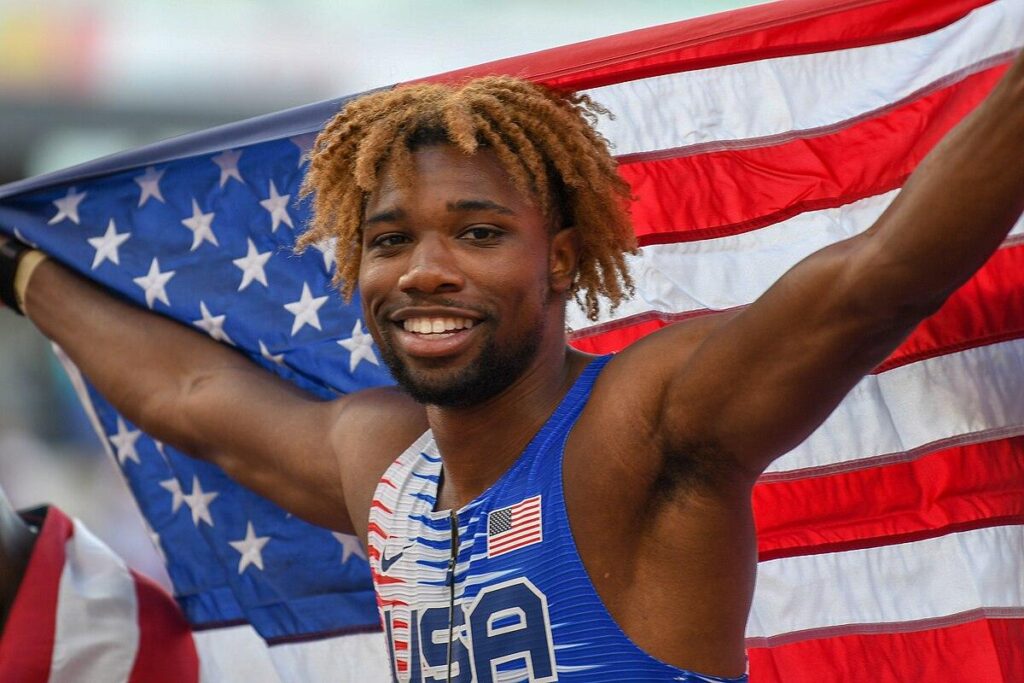American sprint sensation Noah Lyles has spoken openly about his emotions following a rare defeat to rising star Kishane Thompson, marking his first loss since the Tokyo Olympics. In a candid post-race interview, Lyles addressed the significance of the setback and shed light on his competitive mindset moving forward. The unexpected result has sparked widespread discussion in the athletics community, highlighting the intensifying rivalry between established champions and emerging talents on the global sprinting stage.
Noah Lyles Reacts to Defeat Against Kishane Thompson in First Post Olympics Encounter
Noah Lyles didn’t hold back his emotions after facing Kishane Thompson for the first time since the Tokyo Olympics, where he experienced an unexpected defeat. Despite the loss, Lyles emphasized his respect for Thompson’s performance, calling it a “wake-up call” that highlights the rising talent in the sprinting world. Speaking to reporters, he acknowledged the need to adapt and improve, stating that the encounter “redefines his motivation” and sharpens his focus on upcoming competitions.
Lyles also highlighted some key takeaways from the race, stressing the importance of strategy alongside raw speed. He pointed out several factors that influenced the outcome, including:
- Starting reaction time – where Thompson gained an early edge
- Acceleration phase – a crucial segment where consistency matters
- Mental preparedness – the psychological side of facing emerging competitors
| Aspect | Lyles’ Assessment | Thompson’s Strength |
|---|---|---|
| Start | Good but slower reaction | Explosive and quick off the blocks |
| Mid-race execution | Solid but lacked aggression | Maintained high speed effectively |
| Finish | Strong but too late | Held form with confidence |
Analyzing the Key Factors Behind Lyles Loss to Thompson on the Track
Several pivotal elements influenced Noah Lyles’ unexpected defeat to Kishane Thompson, marking the first time Lyles has been bested since the Olympics. Reaction time at the start played a significant role, with Thompson launching off the blocks slightly faster, gaining a critical edge in the initial meters. Moreover, Thompson’s race strategy displayed impeccable execution, maintaining consistent stride length and frequency, which kept the pressure intense throughout the race. Lyles, known for his powerful finishing kick, appeared to struggle to close the gap in the final stages, highlighting potential areas for adjustment in his timing and pacing.
Environmental and physical conditions also factored into the outcome. While both athletes coped well with the track environment, subtle differences in training cycles and recovery status may have contributed to the performance gap. Thompson’s recent focus on explosive starts and improving endurance appeared to pay dividends, whereas Lyles admitted post-race that he was still tapping into peak fitness following the intense Olympic schedule. The table below summarizes the key performance metrics that influenced the race outcome:
| Factor | Lyles | Thompson |
|---|---|---|
| Reaction Time (seconds) | 0.145 | 0.130 |
| Top Speed (km/h) | 37.5 | 36.9 |
| Acceleration Phase Duration (meters) | 40 | 35 |
| Stride Frequency (strides/s) | 4.2 | 4.4 |
What This Outcome Means for Lyles Ahead of Upcoming Competitive Seasons
Noah Lyles has taken a transparent approach following his first loss to Kishane Thompson since the Olympics, signaling a renewed focus and determination as he eyes the upcoming competitive seasons. This setback, rather than discouraging him, appears to have ignited a fresh sense of purpose. Lyles emphasized the importance of using this experience as a learning opportunity, highlighting that every race – win or lose – shapes the mental and physical resilience needed for championship-level performance.
Looking ahead, Lyles’ reaction suggests a strategic adjustment in his preparation and mindset. Key areas of emphasis include:
- Enhanced Training Tactics: Incorporating lessons from this loss to refine speed and endurance.
- Psychological Fortitude: Building stronger mental toughness to handle high-pressure environments.
- Competition Analysis: Studying rivals like Thompson to anticipate and counter their strengths effectively.
| Focus Area | What Lyles Will Improve |
|---|---|
| Start Reaction Time | Sharper launch off the blocks |
| Mid-Race Strategy | Optimized lane positioning |
| Finish Sprint | Maximize acceleration in final 20 meters |
Strategies Lyles Can Implement to Regain Competitive Edge Moving Forward
Refocusing training methodologies could be key for Lyles in reclaiming his dominance on the track. Incorporating advanced biomechanical analysis and personalized strength conditioning may help him identify and correct subtle inefficiencies that have crept into his sprinting form. Additionally, embracing data-driven recovery protocols, such as cryotherapy and optimized nutrition plans, can enhance his physical resilience, ensuring he arrives at competitions in peak condition.
Moreover, diversifying competitive exposure through participation in a wider range of international meets offers the opportunity to adapt to varied race dynamics and pressure scenarios. Building a mental edge by working with sports psychologists to sharpen focus and manage competitive stress could provide the psychological boost necessary to counter emerging rivals like Kishane Thompson. Below is a quick comparison of key focus areas for Lyles moving forward:
| Focus Area | Potential Benefit | Implementation Strategy |
|---|---|---|
| Biomechanical Analysis | Improved sprint efficiency | Motion capture & expert coaching |
| Recovery Optimization | Faster muscle repair & energy restoration | Advanced therapies & tailored nutrition |
| Competitive Diversity | Enhanced adaptability under pressure | Broader meet participation worldwide |
| Psychological Conditioning | Stronger mental resilience | Regular sessions with sports psychologists |
Future Outlook
As the rivalry between Noah Lyles and Kishane Thompson continues to develop, Tuesday’s meeting marked a significant moment in their evolving dynamic. While Lyles acknowledged the competitiveness on display, he remained candid about his emotions following the defeat, underscoring the heightened stakes since the Olympics. Fans and analysts alike will be watching closely to see how both athletes respond in the upcoming meets, as the world’s sprinting elite prepare for the next chapter in this compelling sporting narrative.





